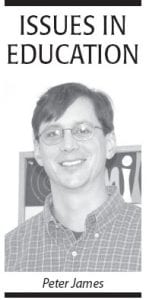A familiar saying warns that our respect for both sausage and legislation is enhanced if we avoid witnessing the process by which each is made. Speaking as a sausage lover, I can appreciate the sentiment. However, I think our society has not been well served by the generally apathetic attitude we have developed toward the many political events that occur between major elections.
Certainly that attitude is not solely of our making. Professional lobbyists and organizers have been happy to shroud the process in secrecy in order to obscure their activities. Elected officials quickly become insulated from the constituents they purportedly represent, and their motivations distorted to reflect the priorities of entrenched political interests.
Major media portray effecting change in this environment as incredibly complex, and influencing decisions as the work of well-funded power brokers, not individual citizens. Given a situation framed in this way, it is no wonder people feel their efforts are futile and that the process is best left to the professionals.
Yet allowing others to frame the situation for us, to choose the issues or questions to be addressed, or to limit the role we can play in the process makes us complicit in creating this discouraging environment. Taking the initiative to engage in the process as an informed, passionate constituent is the first step to break down the illusions of powerlessness. Providing opportunities for others to join you in advocating for shared priorities rebuilds a system of truly representative government.
So what does this have to do with education? Well, as it pertains to public education at least, pretty much everything. Legislation determines the nature, scope, and funding of public schools and their programming. It defines most of its structures, operations, and limitations. It establishes nearly all of the requirements with which public schools must comply. As a result, legislation effectively determines the priorities that drive local decision-making, restricting the flexibility and independence of local school boards and administrators.
People several layers removed from our students are deciding not only how much schools will be paid to educate them, but many of the “who, what, where, when, and hows” of educating them as well. We end up expecting schools to achieve educational excellence with their hands tied behind their backs. Here are a couple specifics to back up the rhetoric: 1. No Child Left Behind and other laws not only require school-wide standardized testing, but also impose penalties for non-compliance or failure to meet the legislated goals. This creates an incentive to focus curriculum and teaching toward passing the tests, not on genuine understanding or enrichment. 2. Through its policy of financial holdbacks, the state transfers the burden and cost of borrowing money to schools.
The state promises a certain amount of funding, yet “holds back” 30% of this until the year after the school pays its bills. This effectively reduces the amount of funding available for education, as schools pay interest on the loans necessary to meet their financial obligations.
Certainly, there are more examples. The point is that the ambiguity, contradiction, inefficiency, and similarly dysfunctional unintended consequences we see in public education tend to flow from legislative negotiations and compromise. However, to consider legislators mindless drones serving special interests is also a faulty presumption. Most compromises are not settlements between good and evil, but arise from difficult decisions trying to balance competing virtues. To craft a solution that serves our priorities, our representatives must first hear our priorities.
Our DFL Governor wants to fund all-day kindergarten and other education initiatives, but needs to raise taxes significantly to do it. Our Republican legislative majority wants to eliminate the $6.2 billion budget deficit without raising taxes, but will need to address the 40% of the budget that represents K-12 education spending. Where will they find middle ground? Who knows, but we cannot allow hopeless, defeatist attitude result in an abdication of our important role in the process. To do so is to accept the perpetuation of a system that has failed to serve the needs of those striving toward educational excellence.
Here are some folks in St. Paul (zip code 55155) who need to hear from you:
Governor Mark Dayton
800-657-3717)
mark.dayton@state.mn.us
130 State Capitol
75 Martin Luther King Blvd.
State Representative
David Dill (651-296-2190)
rep.david.dill@house.mn
100 Martin Luther King Blvd.
Room 273
State Senator Thomas Bakk
(651-296-8881)
www.senate.mn/
senatorbakkemail
75 Martin Luther King Blvd.
Room 226
Each month a representative of our local schools will offer thoughts in Issues in Education. This month’s contributor is Peter James, superintendent of Great Expectations School.



Loading Comments